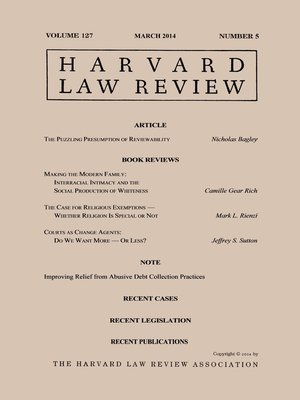
Sign up to save your library
With an OverDrive account, you can save your favorite libraries for at-a-glance information about availability. Find out more about OverDrive accounts.
Find this title in Libby, the library reading app by OverDrive.



Search for a digital library with this title
Title found at these libraries:
| Library Name | Distance |
|---|---|
| Loading... |
The March 2014 issue (Volume 127, Number 5) features the following articles and review essays:
In addition, student case notes explore Recent Cases on such diverse subjects as standing in increased-risk lawsuits, concealed carry permits, free speech and wedding photography, customary international law, and class action tolling in securities cases, as well as Recent Legislation involving domestic violence and Native American tribal jurisdiction. Finally, the issue includes several summaries of Recent Publications.
The Harvard Law Review is offered in a quality digital edition, featuring active Contents, linked notes, active URLs in notes, and proper ebook formatting. The contents of Number 5 (Mar. 2014) include scholarly essays by leading academic figures, as well as substantial student research. The Review is a student-run organization whose primary purpose is to publish a journal of legal scholarship. The organization is formally independent of the Harvard Law School. Student editors make all editorial and organizational decisions.







